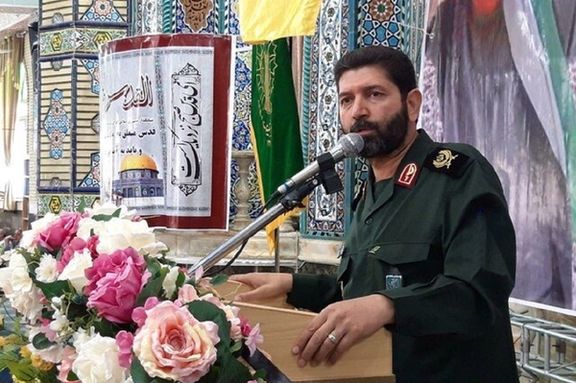IRGC Rules Out Any Compromise Over Its Freedom Of Action

A Revolutionary Guard commander fears that some in Iran might surrender to the idea of limiting IRGC's power in a bid to make a nuclear deal with Washington.

A Revolutionary Guard commander fears that some in Iran might surrender to the idea of limiting IRGC's power in a bid to make a nuclear deal with Washington.
Speaking before the Friday prayers in Tehran on April 22, Gen. Hassan Hassanzadeh called those elements "lowly people and those who have sold their soul to the enemy."
Hassanzadeh is a key figure although he is not often mentioned in the media. He is the commander of IRGC forces in the capital Tehran, a fearsome unit that has been often used to suppress popular protests and is tasked with defending the Islamic Republic's centers of power.
Nuclear talks with Iran have come to a standstill since March after Tehran demanded that Washington remove the IRGC from its Foreign Terrorist Organization list.
The Biden administration has said that if Iran wants sanctions relief beyond those imposed for its nuclear activities it should be ready to negotiate over regional issues, effectively meaning limiting its interventions in other countries.
Iran's Foreign Minister had said in March that IRGC commanders are prepared to sacrifice their interest for the greater interests of the Islamic Republic and forego the call for delisting the IRGC to facilitate an agreement between Tehran and Washington.
Hassanzadeh said: "I wish to tell all the enemies and mean elements who have sold their soul to the enemies that the IRGC will never and by no means be limited."
The Commander of the IRGC's naval force Alireza Tangsiri on Thursday announced that Iran will not give up its intention of seeking revenge for the killing of former Qods Force Commander Qasem Soleimani, insisting that the IRGC would never forget the idea of seeking revenge.

The commander of IRGC's ground forces Mohamad Pakpour also claimed that "even the killing of all of US leaders will not be enough as a revenge for the murder of Soleimani."
These comments by IRGC commanders come at a time when many in Iran, including politicians are disappointed with the dim prospects of an agreement that could lift economic sanctions.
Former Iranian diplomat Ghassem Mohebali told Nameh News website that the Iranian government is still not inclined to offer explanations about the contents of any draft agreement with the US side.
"This is partly because of the weakness of Iran's negotiating team and its members' lack of familiarity with the way diplomacy works," he said, adding that "putting forward matters that were not part of the 2015 deal (JCPOA) could also be another hindrance." These matters include the role of the IRGC in the region as well as Iran's ballistic missile program.
He warned that the deadlock could lead to taking Iran’s nuclear breaches to the UN Security Council, where the other side has the right to veto any decision.
Meanwhile, Hossein Shariatmadari, the editor of hardline daily Kayhan, who is close to Supreme Leader Ali Khamenei's office said in an interview with Iran's state-owned radio that "the negotiations are not likely to lead anywhere” because the US is creating other issues outside of the nuclear question.
Shariatmadari added that some countries including South Korea are undermining Iran's right and refusing to pay their debts to Tehran fearing that they might be affected by US secondary sanctions. He added that the Americans have linked some of their sanctions to the JCPOA while they have withdrawn from the agreement and are no longer part of the JCPOA.
Shariatmadari further added that the JCPOA was a golden document for the US side while it did not have any benefit for Iran.
Iranian analyst Mehdi Ayati also told Nameh News that he is not optimistic about a possible agreement with Washington, because he believes that the JCPOA ended when former US President Donald Trump pulled out of the agreement in May 2018.